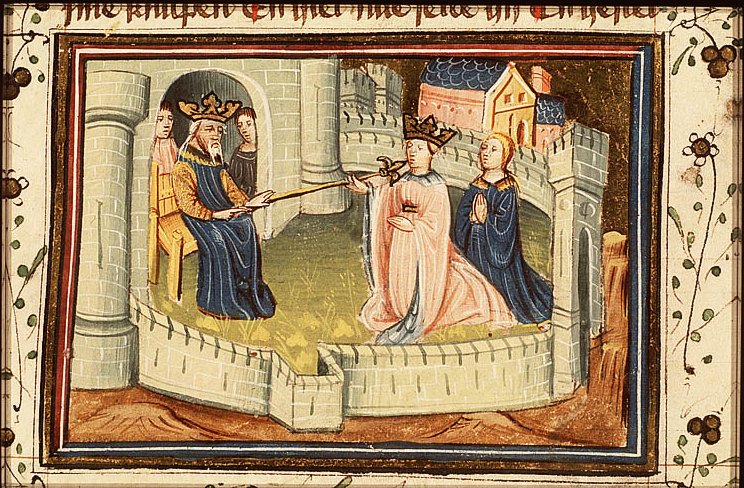Tomorrow evening I will walk with my sisters… or more accurately stand in line with my sisters—and seek admittance into the priesthood session of general conference. Many are calling it a protest. I’m inclined to dismiss the complaint, because it would seem these days that when anyone does something that others find uncomfortable, they label it a protest (even be it as benign as standing quietly in line, asking kindly for a seat, and then quietly leaving if told no). But I keep being met with this idea that this is obviously a protest, because we have already been told we are not welcome.
I suppose the suggestion, then, is not to ask a question you already know the answer to.
Which brings me to Esther, Queen of Persia. Her husband, the King Ahasuerus, had recently given notice to his wife Vashti, because she had the audacity to challenge him. (Girl had some radical self-respect, but she’s not who I want to focus on here.) The only reason Esther was given a place in the King’s harem was because Vashti was dismissed, and because she was exceedingly pretty.
And this is where the story gets interesting. When Esther learns, through her uncle Mordecai, that an advisor (of sorts-more like Prime Minister, I guess) to the King had developed a plot to have all the Jews slaughtered, she determines to go to the King and ask him to stay his hand. It is important to note, here, that the King up to this point did not know that Esther was a Jew. If he had, she *never* would have been queen. Vashti had been a woman of noble birth, and well favored by the King—she was his favorite wife. But when she displeased him he put her out. The only reason her punishment wasn’t worse, was because of her nobility.
Esther, in revealing her heritage and challenging the King in the same moment, had very good reason to fear for her life. There was no reason for her to suspect any other outcome. But her uncle persuaded her, convincing her that she couldn’t just stand by while the Jews were destroyed. She was scared, but she committed to petition the king, saying, “and if I perish, I perish.”
Even though Esther was pretty sure she knew the (not favorable) answer to her plea, she had the moral fortitude to ask anyway, because she believed it was the right thing to do.
This is how I feel about the plea (I cannot emphasis enough that it is not a protest) I will be making with my sisters tomorrow. Our petition is that the leaders of the church seek revelation on the matter of female ordination. And we know—for reasons similar to how Esther knew—that based on what has happened in the past and based on who we are, that we are likely to be turned away. As Esther was, I know that many of us are very nervous. I am very nervous. As Esther did, we have asked others to fast and pray on our behalf. As Esther had, we have the conviction to do this asking, even if the answer is not affirmative.
I’ve very little hope that, as was the case with Esther, we will be surprised with a favorable response. I have prayed, and have felt the confirmation of the Spirit that on April 5th, this is where I need to be and what I need to be doing. No matter what the outcome is, I will go and do what the Lord wants me to do. But really, Esther and Mordecai had some hope that things would work out. They had faith that they were there in the right time and right place to bless the lives of others. I can also choose to believe that there is always some hope. I’ll never give up on that. Even if our efforts are not rewarded tomorrow night, I will still hope that, as Mordecai put it, enlargement and deliverance will be ours another day.






I like your phrasing. This is a plea. Pray for us, and tell us about it. Tell us what you are asking so that we know we are being heard. Some members of OW may only be willing to accept one answer, but the few I know intimately would feel so much relief to just know, for sure, that their questions were being taken to the Lord–even if the answer were “Not now.”
I seem to recall someone else pressuring the Prophet to seek revelation on their specific request. Oh yeah, it was David Whitmer. Something tells me that you won’t be satisfied if the answer is anything other than what you’re looking for.
David Whitmer didn’t listen after being explicitly given an answer from the Lord two times. And then the Lord granted his request and eventually forgave him and allowed him to be a witness of the gold plates. At least wait until the prophets tell these women that they have asked God for this revelation and tell them what He has answered before judging their willingness to follow the oracles of God. And even then, don’t forget the power of repentance and forgiveness. God’s generosity often exceeds our own.
I wish you the best of luck in seeking to attend the Priesthood session, Leah!
I will be with you in spirit.
On a related note, it sounds like the Church just announced that news media will be banned from Temple Square during General Conference.
Look out for tanks.
Leah, I loved this. What a wonderful narrative. Thanks so much for your brave honesty and willingness to be vulnerable here.
It’s a “protest” because the action is to appeal to the media and the broader society at large to pressure for change. OW does not seem to understand that the Church is not a political democracy. To me, OW’s public protest actions are naive and work against their own self-interest. They corner church leaders in the position of having to make changes in response to public pressure, rather than in response to an answered appeal to God. The leadership cannot be credible with the other 99.9% of the church membership by making such fundamental change if there is a perception that it is a response to public pressure rather than revelation from God. OW needs to change it’s methods if it really wants to inspire a change.
All they want is the leadership to ask the question. What is wrong with that. Please ask The Lord is their plea.
Paul… I don’t see anything wrong with a plea to God or to God’s prophets. I am personally sympathetic to their plea and you will find my name on their petition.
However, I think it is disingenuous and actually works against their cause to make a public display of their plea, knowing full well the media impact of pictures of respectable women being denied entry to a men’s meeting. That is a method that is designed to mobilize public opinion and media sympathy to their cause, which is more likely to create resistance from church leadership, rather than support.
I have no problem with their cause but I disagree with some of their methods.